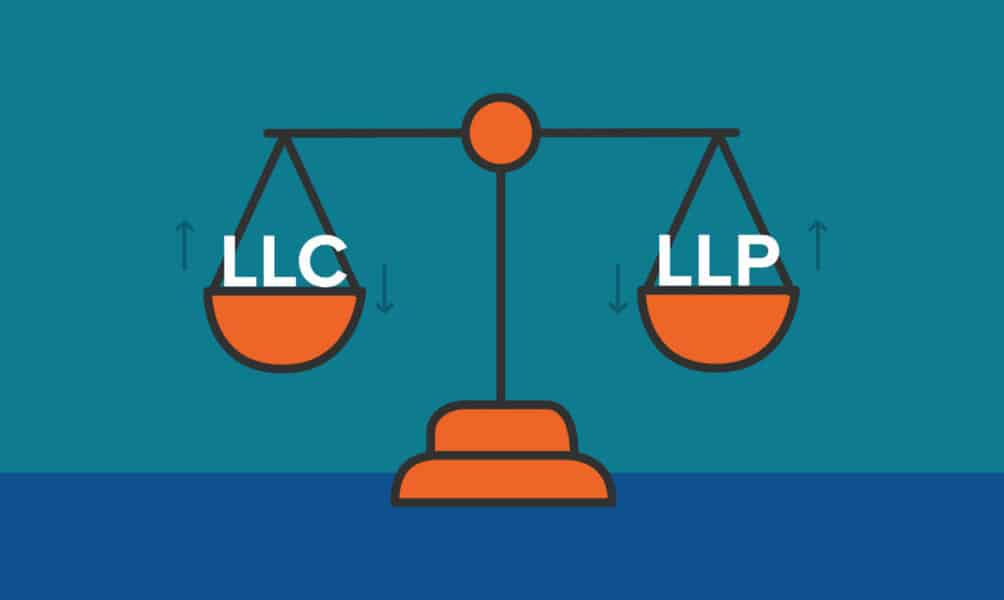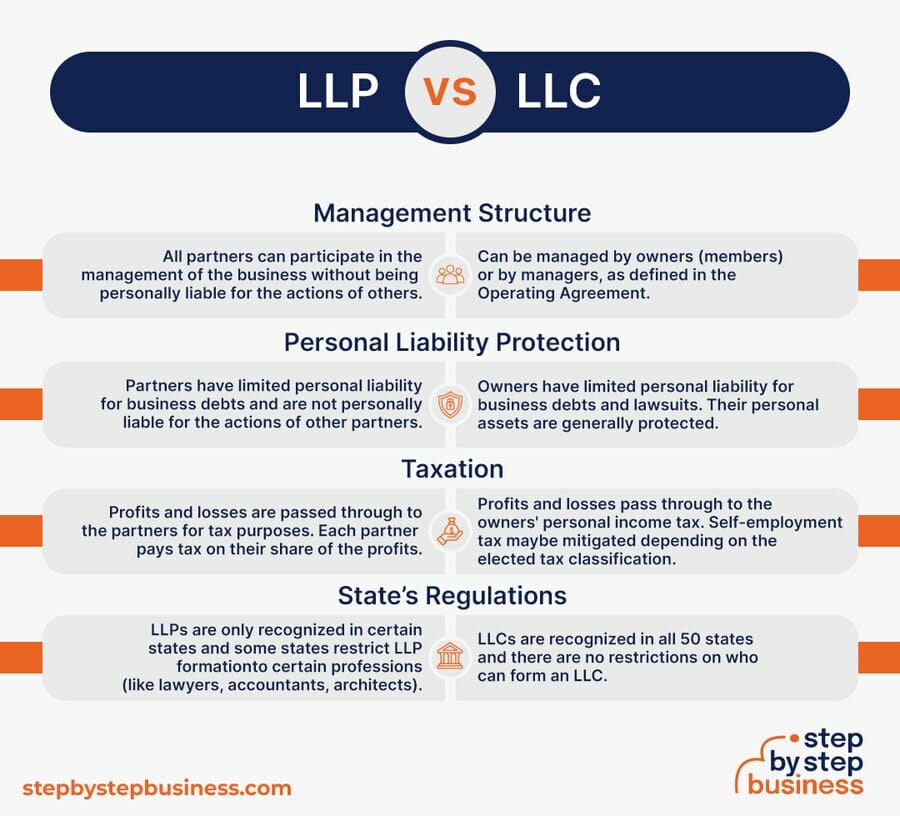If you’re starting an LLC, the business entity formation process is one of the first and most important hurdles. This step can be terribly complex ...
Differences Between an LLC and an LLP
Written by: Carolyn Young
Carolyn Young is a business writer who focuses on entrepreneurial concepts and the business formation. She has over 25 years of experience in business roles, and has authored several entrepreneurship textbooks.
Edited by: David Lepeska
David has been writing and learning about business, finance and globalization for a quarter-century, starting with a small New York consulting firm in the 1990s.
Published on January 19, 2022

There are a number of decisions to make when starting a company, including which business entity type to choose. If you’re starting a business with one or more partners, two of your choices are a limited liability company (LLC) and a limited liability partnership (LLP). Before you make a decision you should know that not all states allow LLPs, which are also not available to all types of businesses.

What Is an LLC?
An LLC is an increasingly popular business structure for startups, offering liability protection for ownership and greater flexibility than a corporation, particularly in terms of taxes. The LLC itself does not pay taxes. As a “pass-through” entity, income passes through the business to the owner or owners, who report it on their personal tax returns. An LLC is created by filing paperwork with your state, and nominal fees are involved.
An LLC offers its owner or owners, who are called members, considerable flexibility in terms of management. You can choose your management and operational structure and decide how you want to be taxed. Your LLC can have a single member or multiple members, all of whom have personal liability protection, meaning your personal assets are not at risk if you cannot pay business debts or are involved in a lawsuit.
What Is an LLP?
An LLP is a general partnership, which is a business with two or more owners, that has limited liability protection for the partners. LLPs are for businesses that require professional licensing, such as doctors and lawyers. About 40 states allow LLCs, and each has different rules about which professionals can form LLPs.
This presents a potential problem if your LLP does business in more than one state. If you run an LLP but do business in a state that does not recognize LLPs. you would likely have no liability protection in the event of a lawsuit in that state.
LLPs are taxed much like general partnerships. Partnerships are not considered separate entities from the owners and are not taxed. Profits and losses are passed through to the partners who report the income on their personal tax returns on a Schedule C. Partners may be eligible for the 20% pass-through deduction that was part of the Tax Cuts and Jobs Act, meaning they can deduct up to 20% of business income.
Key Differences Between an LLC and an LLP
1. Management Structure
One key difference is in the management structure. In an LLC, the management structure is very flexible and owners can choose how the LLC will be managed. The LLC has two main options:
- A Member-Managed LLC is managed by the members of the LLC. This is usually chosen by smaller LLCs with few members who will be involved in various management roles.
- A Manager-Managed LLC is managed by people who are not members of the LLC and are employees of the business. This structure is often used when an LLC is larger and has multiple members.
In an LLC, the management roles and responsibilities are specified in the operating agreement. An operating agreement is not usually required but is highly recommended. The operating agreement should clearly define the following:
- The percentage of each member’s interests in the LLC
- How profits and losses will be allocated to each member
- Each member’s rights and responsibilities
- The management structure and management roles of members
- The voting rights of each member
- Rules for meetings and voting
- What happens when a member sells their interest, becomes disabled, or dies
It’s a good idea to have an attorney’s help when creating your operating agreement so that you can be sure you’re covering all bases to protect all members and avoid future issues.
In an LLP, the management is just like a general partnership, where all management duties are equally divided between partners. Management roles and the ownership structure is detailed in a partnership agreement, which is very similar to an operating agreement.
2. Personal Liability Protection
The other key difference is in personal liability protection.
In an LLC, all members’ interests are protected from the liabilities of the company.
In an LLP, each partner is personally liable for their own actions, but not the actions of the partners. If one partner is sued, his or her personal assets are at risk, but the assets of other partners are not.
However, in some states partners can be personally liable for the debts of the company. Some states also require LLPs to have liability insurance.
3. Taxation
In terms of taxation, LLCs and LLPs are very similar. Income is passed through to the owners and reported on their personal tax returns. The exception to this is if the LLC has chosen to be taxed as a corporation. To do so, the LLC must file a document, referred to as an election, with the Internal Revenue Service (IRS). The LLC must then decide if it wishes to be taxed as an S corporation or a C corporation.
C Corp status means profits are taxed at the current rate for corporations (21% as of early 2022), which is significantly lower than the typical individual taxpayer rate. But keep in mind, C Corp shareholders, which includes members, must also pay taxes on their distributions (but not self-employment taxes). Thus, the C Corp is subject to what is sometimes referred to as double taxation.
As with a partnership and an LLC, S Corp taxation considers the LLC a pass-through entity, which means income passes through the company into the hands of the owners. At this point, taxes are applied at the same rate as those of individual taxpayers.
S Corps use Form 1120S to file their taxes, which is used to report the income, losses, and dividends of S Corp shareholders. S Corp shareholders do not pay self-employment taxes, which is the primary advantage of S Corp status compared to sole proprietorship or partnership.
Generally, S Corp tax status is beneficial if the company is profitable enough to pay the owners a salary and at least $10,000 in annual distributions. This way, the owners can be taxed as employees and not pay self-employment taxes. It costs more to run an S Corp than an LLC due to additional bookkeeping and payroll expenses. Thus, the tax benefits should be more than the additional costs for an S Corp status to make financial sense.
4. State’s Regulations Can Differ for an LLP
The final key difference between an LLC and an LLP is that only certain types of businesses can form as LLPs, and only in some states. You should check your state’s regulations to see if an LLP is an option for you.
In Closing
The key differences between an LLC and LLP are the management structure, personal liability protection, and taxation flexibility. These differences should be considered carefully before you make a decision. It’s highly recommended that you seek the advice of an attorney to make sure that you make the right choice for you and your business.
Subscribe to Our Newsletter
and gain insider access to cutting-edge business insights and trends.
Featured Resources

10 Best LLC Formation Services
Published on August 22, 2022
Read Now

Series vs Restricted LLC: What is the Difference?
Published on February 15, 2022
Limited liability companies (LLCs) are an increasingly popular business structure for startups, offering liability protection for ownership andgreat ...
Read Now

6 Advantages of Forming an LLC
Published on September 28, 2021
When starting a new business, choosing a business entity type is one of the most important decisions you’llmake. Many startup ownerschoose ...
Read Now
Comments